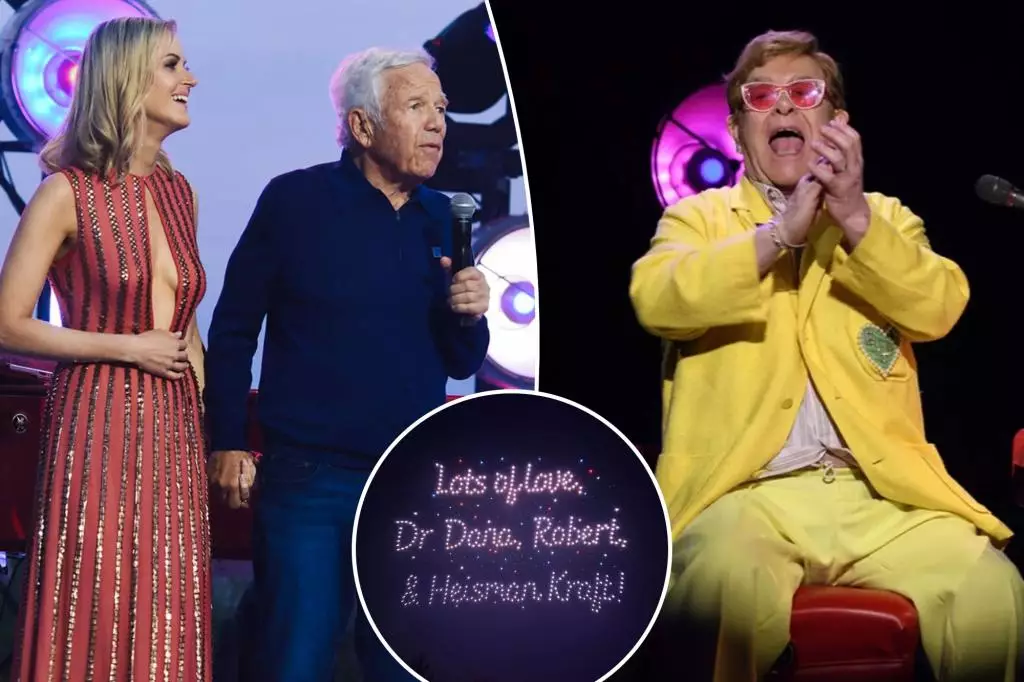The recent Fourth of July celebration hosted by New England Patriots owner Robert Kraft and his wife, Dr. Dana Blumberg, in the Hamptons exemplifies a masterclass in blending high-profile entertainment with meaningful symbolism. Unlike ordinary parties, this event was meticulously curated to serve as both a celebration of patriotism and a statement of social responsibility. The presence of legendary Elton John, performing exclusively for the elite guest list, elevated the gathering from a mere social event into an artful display of unity and cultural influence. His hour-long set, including a heartfelt dedication of “Don’t Let the Sun Go Down on Me,” underscored the event’s emotional depth, while his eye-catching yellow suit and flown-in performance added spectacle and exclusivity. Such details reflect a keen understanding of the power of celebrity to inspire and connect audiences, transcending entertainment to forge a deeper sense of communal identity.
Innovative Visuals and Symbolism Reinforcing Patriotism
What sets this celebration apart is its seamless integration of technology and symbolism. The jaw-dropping drone show was an awe-inspiring spectacle, transforming the night sky into a canvas of strategic imagery—Patriots logo, American flag, the likeness of Kraft’s dog Heisman, and even a portrait of Elton John himself. These visuals birthed a palpable sense of national pride while subtly emphasizing the importance of individual stories and figures within the larger patriotic narrative. Guests donned blue square pins representing the Foundation to Combat Antisemitism, aligning their presence with a broader campaign against hate. Such symbols are more than accessories; they are declarations of values, serving to elevate the event from a celebration to an act of social activism, reinforcing the idea that high-profile gatherings can serve as platforms for positive change.
Exclusivity as a Reflection of Social Influence
The guest list speaks volumes about Power, influence, and social capital. Entertainment icons like Jon Bon Jovi, Kenny Chesney, Sylvester Stallone, and Jerry Seinfeld mingled with influential business leaders and sports legends, underscoring the event’s reach across multiple spheres of society. The attendance of figures from diverse industries—athletics, music, finance—embodies an elite ecosystem committed to celebrating freedom, heritage, and the importance of standing against hate. Moreover, Kraft’s history of hosting high-profile events, from Dave Matthews performing at past celebrations to the previous appearance of DJ Grandmaster Flash, cements his reputation as a facilitator of culturally significant gatherings. This event exemplifies how certain social configurations can foster both enjoyment and purpose, making their significance resonate long after the festivities end.
Beyond Glory: A Statement of Cultural Leadership
What many may overlook in such celebrations is their subtle but powerful message about societal leadership. Kraft’s decision to incorporate symbolic elements—like the American flag crafted from crystals and pins promoting anti-hate campaigns—demonstrates a conscious effort to merge entertainment with cultural responsibility. The event was not merely about spectacle or status but about building bridges and promoting unity amid a divided world. It positions the hosts not just as privileged figures but as active catalysts for social cohesion. The inclusion of high-profile figures from different backgrounds emphasizes that true influence resides in fostering shared values, advocating for inclusion, and spearheading initiatives that challenge hate. This event, therefore, becomes a blueprint—a reminder that power and privilege can serve a higher purpose when wielded thoughtfully and with intent.
